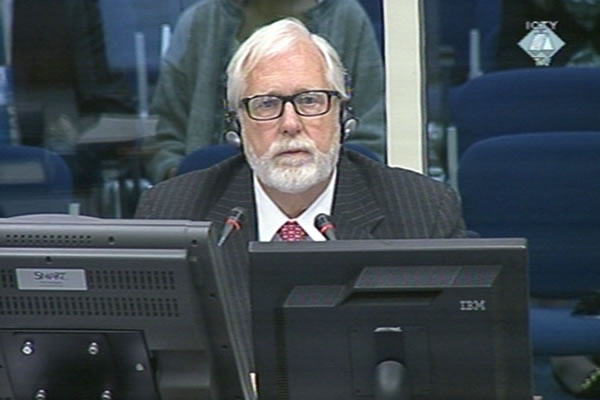Home
RATKO MLADIC’S ‘INFLUENTIAL VOICE’
When prosecution expert Robert Donia was asked to comment on the role of the accused in the work of the Bosnian Serb Assembly, he said that as the Army commander he could not participate in the decision-making process in an official capacity, but in practice, his was ‘an influential voice’: he could ‘present proposals, advocate policies and take part in debates’
 Robert Donia, witness at the Ratko Mladic trial
Robert Donia, witness at the Ratko Mladic trial After suggesting yesterday that the Bosnian Serbs were afraid of being reduced to a minority and stripped of their status as a constituent nation, Ratko Mladic’s defense counsel continued putting similar arguments to the US historian Robert Donia as his cross-examination continued. According to Lukic, on the eve of the war, the Serbs in BH feared the loss of their status of a constituent people, and the ‘replay of genocide’ - the crimes committed against them in World War II.
The prosecution expert, who has a PhD in the history of the Yugoslav peoples, said he could not say just how strong the fear of genocide was, but he knew that the Bosnian Serbs were constantly told by their political and intellectual elites that ‘they should be afraid’.
Donia also said he found no evidence of any intent to strip the Bosnian Serbs of their status as a constituent people, as had been done in Croatia in the new Constitution. The fact that the Serb members of the parliament could be outvoted did not necessarily mean that a nation would be reduced to a minority, he added. Outvoting is an integral part of life in a democracy: sometimes your proposals get accepted, sometimes they are rejected.
As in one of the two expert reports admitted into evidence the witness analyses the speeches made by the persons who attended the Bosnian Serb Assembly sessions, Branko Lukic asked him to define Mladic’s role in the parliament. Specifically, the defense counsel wanted to know if Mladic could vote or just make proposals. As Donia explains, in his official capacity as the Army commander, Mladic could not make any proposals, let alone take part in the decision-making process. And yet, in reality, Mladic’s was ‘an influential voice’: he could ‘present proposals, advocate policies and take part in the debates’. He attended eight out of a total of 66 sessions of the Assembly, but his generals often attended other sessions.
This was the fifteenth time that Robert Donia testified before the Tribunal. He spent three and a half days in the witness stand in what is his last evidence. Despite the claims of the defense that the accused will find it hard to participate in his trial five days a week because of his ill health, he was quite active today and yesterday, consulting his defense counsel. He was cautioned several times because he spoke too loud.
After Donia completed his evidence, the prosecution called Emir Turkusic, former employee of the Anti-Sabotage Department in the BH Interior Ministry.
Linked Reports
- Case : Mladic
- 2013-08-26 VIOLENCE AGAINST SARAJEVO A ‘PROPAGANDIST CARICATURE’
- 2013-08-23 MLADIC’S TRIAL ADJOURNED TEMPORARILY
- 2013-08-22 DRINA RIVER WAS NOT TO BE THE BORDER
- 2013-08-28 JUSTIFYING THE SHELLING OF SARAJEVO
- 2013-08-29 ‘INSANE’ THEORIES ABOUT CAUSE OF MARKALE EXPLOSION
- 2013-08-29 MLADIC WANTS WEDNESDAYS OFF
